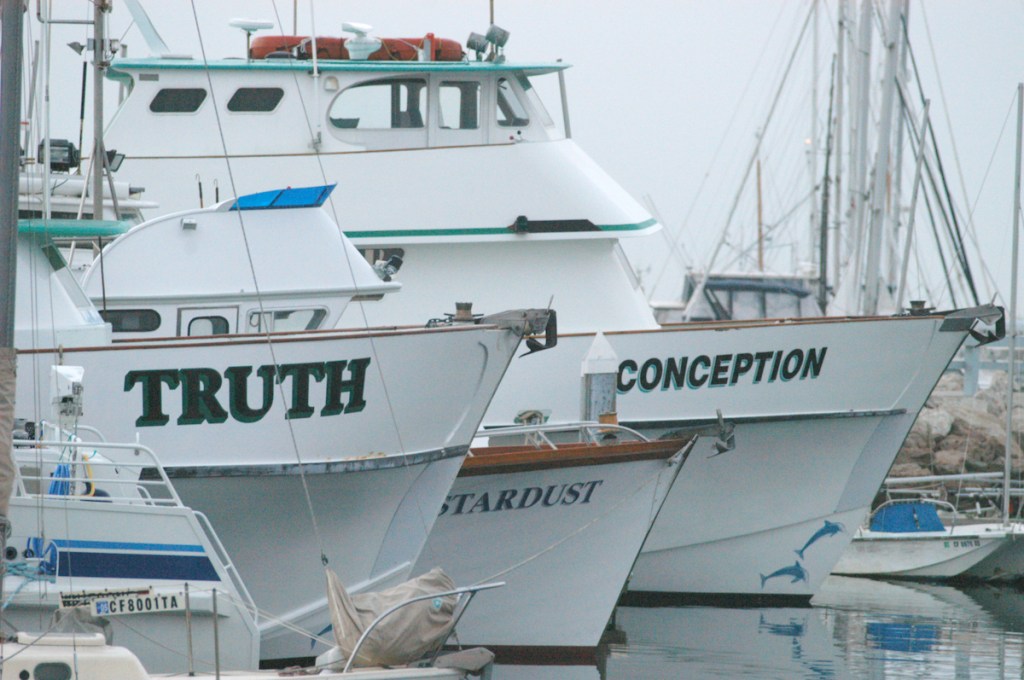New regulations for smoke detectors, emergency exits, and Safety Management Systems aboard overnight passenger ships are now being written by the Coast Guard, largely in response to the 34 lives lost in the Conception disaster in 2019. The horrific fire that trapped all the passengers below decks was judged by the National Transportation Safety Board (NTSB) to be due in part to lax attention to regulations onboard the ship and also to a need to update maritime law.
The Coast Guard came under fire at Congressional hearings for having dragged its feet in enacting new rules that might have averted the tragedy. Sixteen months later, a February 11 letter from the Coast Guard to the NTSB lists the actions the Guard will take. But Vice Admiral Scott Buschman, deputy commandant for Coast Guard Operations, gives Robert Sumwalt, chair of the NTSB, few indications of when the actions would turn into regulations.
For instance, regulations were “under development” for a requirement to add interconnected fire alarms on ships built before and after 1996. Aboard the Conception, smoke alarms existed but were not connected; they were not heard sounding by the surviving crew members during the fire, the NTSB investigators concluded.
Get the top stories in your inbox by signing up for our daily newsletter, Indy Today.
A “rulemaking project,” Buschman wrote, was ongoing to clarify the locations of emergency exits; Coast Guard rules currently imply that they must lead to separate areas on a ship. One issue was how rules applied to ships of different vintages: An unobstructed means of escape was only required for ships built after 1996. The Coast Guard would now “pursue” applying the rule to those built earlier. In the case of the Conception, which was built in 1981, the escape hatch leading up from the bunkroom was narrow, squeezed in tightly above a bunk, and opened into an enclosure in the galley where the fire was raging that morning.
A rule requiring a Safety Management System (SMS), or an organized safety plan the crew could rely upon, had been written and is in a public comment stage that ends in April. An SMS for passenger ships is otherwise a voluntary advisory, much as the Coast Guard had advised shortly after the Conception fire that small vessels with overnight passengers keep an eye on lithium-ion batteries while they charge. Public speculation placed the cause of the fire on the batteries, many of which were left charging in the galley after the passengers enjoyed a night dive off Santa Cruz Island. The NTSB did not find evidence to support that theory, though its final report stated that some evidence was in the possession of the FBI while criminal charges were brought against Captain Jerry Boylan.
A singular factor that could have prevented the Conception tragedy – a roving night watch – is already on the rulebooks, Buschman wrote. Ensuring a watch actually took place was the issue, as Coast Guard inspectors were not aboard at night. Buschman’s letter stated his inspectors conducted a campaign regarding night watches immediately after the disaster. Based on what they learned, by early 2021, the annual inspections would include a means to verify “compliance with 24-hour roving patrolman/watchman requirements.” As well, inspectors had existing authority to require a log of night-watch patrols, he wrote, which could be added to the annual Certificate of Inspection passenger vessels were required to have.
Santa Barbara Congressmember Salud Carbajal introduced, with Rep. Julia Brownley and Sen. Dianne Feinstein, many of the safeguards now being addressed by the Coast Guard. The Small Passenger Vessel Safety Act of 2019 passed after it was added to the National Defense Authorization Act for 2020, an annual spending authorization of nearly $740 billion for military operations.
Carbajal, who had forcefully told Coast Guard Rear Admiral Richard Timme that his service was not doing enough quickly enough to protect passengers during a Congressional hearing shortly after the disaster, was pleased with the actions now being taken:
“I am grateful to see that the Coast Guard is moving forward with implementing my Small Passenger Vessel Safety Act in a timely manner,” Carbajal said. “The Conception boat fire was an avoidable incident, and I’m thankful the Coast Guard is taking the necessary and imperative steps to protect lives by ensuring a similar incident does not happen again.”
Every day, the staff of the Santa Barbara Independent works hard to sort out truth from rumor and keep you informed of what’s happening across the entire Santa Barbara community. Now there’s a way to directly enable these efforts. Support the Independent by making a direct contribution or with a subscription to Indy+.

